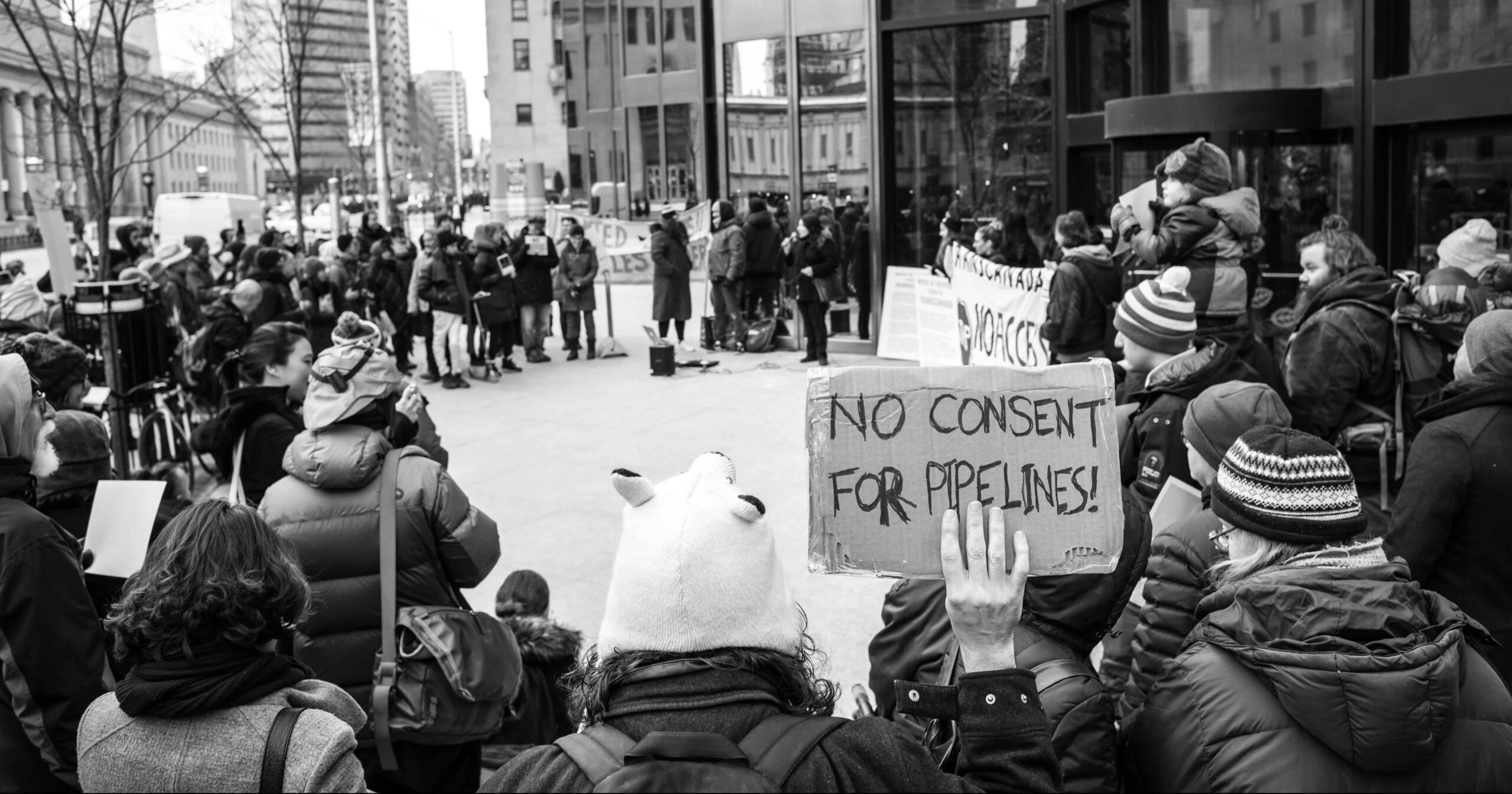- About
- Research
-
-
- Special Reports & Features
- Pretendians and Publications: The Problem and Solutions to Redface Research
- Pinasunniq: Reflections on a Northern Indigenous Economy
- From Risk to Resilience: Indigenous Alternatives to Climate Risk Assessment in Canada
- Twenty-Five Years of Gladue: Indigenous ‘Over-Incarceration’ & the Failure of the Criminal Justice System on the Grand River
- Calls to Action Accountability: A 2023 Status Update on Reconciliation
- Data Colonialism in Canada’s Chemical Valley
- Bad Forecast: The Illusion of Indigenous Inclusion and Representation in Climate Adaptation Plans in Canada
- Indigenous Food Sovereignty in Ontario: A Study of Exclusion at the Ministry of Agriculture, Food & Rural Affairs
- Indigenous Land-Based Education in Theory & Practice
- Between Membership & Belonging: Life Under Section 10 of the Indian Act
- Redwashing Extraction: Indigenous Relations at Canada’s Big Five Banks
- Treaty Interpretation in the Age of Restoule
- A Culture of Exploitation: “Reconciliation” and the Institutions of Canadian Art
- Bill C-92: An Act respecting First Nations, Inuit, and Métis Children, Youth and Families
- COVID-19, the Numbered Treaties & the Politics of Life
- The Rise of the First Nations Land Management Regime: A Critical Analysis
- The UN Declaration on the Rights of Indigenous Peoples in Canada: Lessons from B.C.
- View all reports.
- Special Reports & Features
-
-
- Yellowhead School
- The Treaty Map
- LIBRARY
- Submissions
- Donate
AS WE MOVE THROUGH another colonial election year at the federal level, there is one arena that challenges most politicians: climate change and what we do about it.
Those paying attention to political debates know that taking action on climate appears to be at odds with the economic paradigm created and practiced over the last century and a half.
Rooted in a philosophy of extractivism, Canada’s economy relies on the theft and plundering of Indigenous lands and territories and peoples.
Most of the goods and services created from these extractive industries are the very drivers of climate change itself. Think tar sands, fracked gas, coal, forestry (and as such deforestation), water diversion to support it all, etc.
Considering this extractive economy, it will require a major overhaul for Canada itself to take meaningful action on climate and address the legacy of ongoing colonization, through a transformative economic, social and political shift. It is becoming increasingly impossible to ignore this truth. Droughts, floods, forest fires, super storms, erratic weather patterns, melting sea ice, decline in plant and animal species, and on and on, are increasingly top stories in the daily news (though the media often fails to connect these events to climate change).
While Indigenous peoples have been raising alarms about the state and health of Mother Earth for decades, if not centuries, decrying the abuses heaped upon her, Western science is now catching up, too.
The United Nations’ Intergovernmental Panel on Climate Change (IPCC) asserts that we have less than 11 years to cut global GHG emissions in half – while protecting our remaining cultural and biological diversity – or face catastrophic climate crisis.
It is also becoming increasingly understood that current plans and strategies, including the Paris Agreement, are failing to include or address the legacy of social injustices created by colonization, capitalism, and militarism; forces that destroy the cultural diversity which is key to mitigating climate change. Correspondingly, high-level international and state policies and proposals also fail to include the full participation of Indigenous peoples despite the recognition of the important roles we play in addressing the climate crisis.
This includes the much-heralded Green New Deal.
So what is this Green New Deal thing I keep hearing about?
As I write, environmental groups and centre-left political parties in both Canada and the U.S. are advocating for something called the Green New Deal (GND). Both versions of the GND are predicated on stabilizing current economic systems while simultaneously taking action on climate change, along with challenging current systems of injustice. The narrative of GND is an intentional throwback to the New Deal, an economic stimulus package created after the great depression in the U.S. by President Roosevelt.
As Julian Brave Noisecat writes in his Guardian piece No, climate action can’t be separated from social justice, The “Green” New Deal discussions happening in contemporary America “envisions a society where people have universal access to energy, jobs, healthcare and housing [and] is a call for renewed commitment to the equal distribution of opportunity and justice.”
To achieve these ends, the GND calls for major economic shifts toward a green energy economy.
Meanwhile in Canada, the discussions are more preliminary and revolve around conceptualizing a Northern version of a GND. It includes 150 organizations and prominent Canadians, including CUPE Ontario, the Canadian Health Coalition, the Canadian Unitarian Council, the Canadian Union of Postal Workers, the Union of BC Indian Chiefs, Indigenous Climate Action (that’s us!), Confédération des syndicats nationaux (CSN) and the Migrant Workers Alliance for Change.
The campaign’s current tagline is ripped straight from the IPCC report mentioned above and calls for “rapid, far-reaching and unprecedented changes in all aspects of society.”
Some of the preliminary text of the Canadian GND reads:
A Green New Deal is a vision of rapid, inclusive and far-reaching transition, to slash emissions, protect critical biodiversity, meet the demands of the multiple crises we face, and create over a million jobs in the process. It would involve the full implementation of the United Nations Declaration on the Rights of Indigenous Peoples (UNDRIP) including the right to Free, Prior and Informed Consent (FPIC), dozens of other pieces of legislation, new programs and institutions, and a huge mobilization calling on the creativity and participation of all of us. [LINK]
Sounds nice, doesn’t it? However, I caution your applause. As someone invited to participate in the drafting process for the Canadian GND, I can attest to the difficulty around including language on Indigenous rights.
More, in that process, or all the petitions, town hall events and informational tours led by large environmental non-governmental organizations (ENGO’s) calling for Canadian GND, there were very few Indigenous or racialized peoples involved in crafting this language.
The organization I represent, Indigenous Climate Action, did participate but it was a struggle.
The fact is that the GND is still being created in silos of elitism and is aimed primarily at influencing, and putting pressure on, colonial and corporate power to lead change. While it’s true that governments should be stepping up, history has indicated a stubborn attachment to the status quo, absent the will and commitment of the people. Indigenous Climate Action and other Indigenous organizations and communities are striving to ensure there are measures of accountability and true transformation embedded in moving things forward on the GND to avoid repeating history.
But they are advocating for systems change, aren’t they?
Yes, but they are also advocating for the same forces that drove us into a climate crisis to please pave the way out for us. Asking oppressors for liberation has not proven an effective strategy.
Currently, the GND proposals are focused on changing the energy infrastructure while redistributing wealth but ultimately failing to center the destructive intertwined roles of capitalism, consumerism, militarism and colonialism as foundations to the current crisis.
In other words, the GND in its current iteration is not a structural solution.
In addition, it’s being driven by overwhelmingly White ENGO’s, those with the resources and power, and mainstream political parties. This has meant that participation of Indigenous peoples and organization, including those in the coalition, has been limited. I’m not saying this to attack these spaces, it’s just a fact. Yet they do expect us to be at the table if invited because inclusion and justice are pillars of the GND, at least in name.
While the climate justice movement is working hard to address the legacy of white supremacy and colonialism within environmental and conservation movements, it is a work in progress.
Unfortunately, the development and urgent push for the GND in Canada highlights these continued shortcomings. Everything has been created, albeit with good intent, without our full participation or allowed time necessary to bring more folks to the table. More, the emerging proposals fail to uphold the values of justice and inclusion they advocate for. As a consequence, the GND movement excludes any real engagement with the historic and ongoing challenges Indigenous and racialized communities face. This is yet another example of how our fundamental rights to self-determination and sovereignty are once more overlooked by our allies.
So while the language of the GND may appear to reflect our issues and our people, it is unfortunately superficial, with little real appreciation of the role Indigenous solutions or self-determination can play in the path to an alternative future.
We don’t see ourselves as part of the conversations because historically we haven’t been part of the conversation.
In other words, the GND movement, like the environmental movement generally, must recognize that the Truth and Reconciliation’s “Calls to Action” extend to these spaces as well. A mere commitment to social justice does not erase contributing to injustice.
So the Green New Deal is bad?
No, its not. We absolutely need dramatic change in order to tackle the greatest crisis humanity has ever faced. The core tenets of the GND can get us part way there. However, we must proceed with caution. In its ongoing creation, the GND coalition needs to ensure they don’t continue to leave Indigenous and racialized communities behind. To be just, it cannot continue to be created without our full participation or free, prior and informed consent.
That means we need to be aware of these conversations and require proportional seats at the table: seats that are resourced and supported. We need to ensure we are part of leading and advocating for solutions for our own communities. If the climate justice movement is serious about justice for all it must embody that sentiment and relinquish power, redistributing resources to build the future they call for. After all, the international expertise that the GND draws on has noted the importance of Indigenous knowledge and environmental management as a bulwark against the loss of biodiversity and climate change generally.
Without an acknowledgment of the severed spiritual and mental connection to the natural world we will continue to make the same mistakes.
It is Indigenous communities, locally, nationally and internationally, that continue to push for an actualization of instilling deeper spiritual connections the Mother Earth to help us relearn what systems of colonization, capitalism, and extractivism have severed.
Without these as tenets to a call for systems change it is merely a regurgitation of the same broken structures that perpetuate disconnection and individualism.
The current proposals for the GND, if ever taken up by those politicians, could have lasting impacts for generations to come, paving the way for new social, political and economic systems providing a new baseline.
We cannot afford for history to repeat itself.
As the disability activists of the 1990s taught us, nothing about us, without us.
I don’t think the GND is the answer but it is a tool that could be utilized if we are included as the true leaders we are, as opposed to tokens. Our communities, our knowledge, our values are required as necessary for building pathways for a better future for tomorrow. We are a powerful people and together we must rise, not just for our own communities but for Mother Earth.
Citation: Deranger, Eriel Tchekwie. “The Green New Deal In Canada: Challenges For Indigenous Participation.” Yellowhead Institute, 15 July 2019, https://yellowheadinstitute.org/2019/07/15/green-new-deal-in-canada/
Image by Stan Williams



